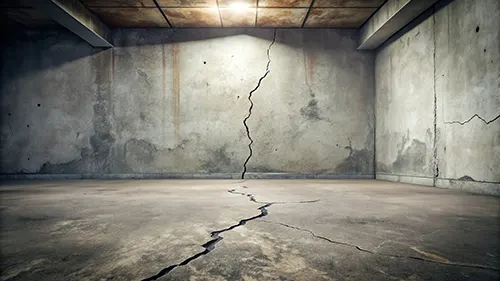Winter is fast approaching and cold weather brings new concerns for even the smallest of cracks in a basement wall. Adam explains the effects freezing temperatures have on basement waterproofing, concrete repair, and preventative maintenance tips for homeowners and businesses. A1 Foundation’s valuable insight will help avert a disastrous flood within the basement, health problems associated with water infiltration, and protect your biggest investment….your home. The devastating effects even a small basement wall crack can have in the winter.

Narrator: So, Adam, winter is fast approaching, and cold weather brings new concerns for even the smallest of cracks in a basement wall. What advice do you have for homeowners this time of year?
Adam: This is an area where people often don't think about or neglect because a lot of times we don't have water coming through there because the ground starts freezing up a little bit and it takes a substantial event like a huge melt or a rain on top of a snowpack that causes some flooding issues. But for concrete foundations, most of the damage between the fall season, which is typically wet, and the spring season that typically is wet, is actually happening in the winter season.
Even though the water is not actually coming in as often, this is where we see cracks get much worse over the period. So why is that? Back 60, 70, 80 years ago, heating systems were so inefficient that just physically heating your house with either forced hot air or if you had a hot water system like a baseboard heat, that would cause so much heat to dissipate into the basement that it would heat up the concrete walls. And those concrete walls would stay warm, and it wouldn't allow water to freeze in those areas.
The problem now is that heating systems are so efficient. Well, now it's a good thing because we save money on fuel expenses, and it makes our houses more energy efficient. The problem with that is it's not throwing off as much heat. I mean, even think about a system that has a 95, 98% efficiency, you could be standing right next to it. It's not warm at all. All that heat is being directed in the correct places.
If a basement is a more unconditioned space where they don't have active heating systems or insulation, those concrete walls tend to get a lot colder than they did back 50, 60, 70 years ago. So why is that important? Well, the hairline crack that you had in the wall that has been fine for years now is a lot colder. And so freezing temperatures on the outside are able to creep through into the concrete foundation. So even if it's not leaking, there's going to be mud and sand and gravel and everything else that's outside packed into that crack. And as it freezes, it expands.
The foundation is not strong enough to resist that pushing apart force of ice. And so that crack then becomes wider. And it may not be wider for you and I to notice, but what it does get wider for is it actually is wider for anything like the sand or dirt that's packed into it. And so that kind of falls out of the way. And then the next rain that comes through or the snow melt that comes through in the spring, that's where we see the water coming in.
So, a crack that has never leaked in 30 years, 40 years, suddenly now is starting to leak. We get this thing every year. That's why as you get into the winter season, our season doesn't stop because we're able to fix these cracks all through the wintertime, and this is where the best time to get it is because before you get to that flooding event or before you get to a damage event where you have structural damage to the foundation because of that freeze thaw cycle, this is where you can get ahead of it and be able to repair the foundation much more simply, much more cost effectively, and keep it from having further damage down the road.
In wintertime, it's often not that I thought about doing any sort of foundation services. But for us, it's one of our highest times to do it because we know that's where all the damage is going to happen, and you can save yourself a ton of money by getting ahead earlier and doing it during the winter season before the floods come in the spring and wreck your basement.
Narrator: Well, thanks, Adam, for explaining the effects freezing temperatures have on basement wall cracks and what should be done about them.
Narrator: If you have a basement water problem and think you need a professional, or, if you’d like more information on foundation crack repair and basement waterproofing topics, please visit A1FoundationCrackRepair.com or call (866) 929-3171. Or you can email info@a1foundationcrackrepair.com. Thanks for listening and keep that basement dry.

